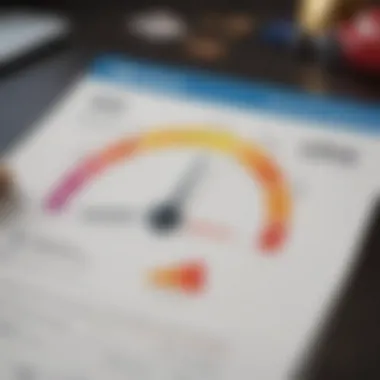The Impact of Late Car Payments on Your Credit Report


Intro
Understanding your credit report is crucial for financial health. Late car payments can greatly affect this report, influencing your credit score and by extension, your opportunities for loans or credit in the future. This article provides in-depth analysis of what happens when payments are delayed and how individuals can mitigate such impacts.
Market Overview
Current Market Trends
The current landscape shows an increased sensitivity to credit health among consumers. Lenders now emphasize the importance of timely payments, which reflect on credit reports. As more individuals become aware of their credit scores, there is a heightened demand for information regarding how payment timelines affect overall financial status.
Economic Indicators Impacting the Market
Several economic indicators play a role in consumer financing. Interest rates, for example, significantly affect borrowing costs. As rates fluctuate, consumers feel the pressure to remain diligent with their car payments. Poor payment history can lead to higher borrowing costs in the long run, creating a challenging cycle for those already experiencing financial constraints.
Global Influences and Major Events
Global events can create financial turmoil, impacting individual payment behaviors. Economic downturns, like recessions, can lead to job loss and diminished income, pushing individuals into default. In such times, understanding the implications of late car payments becomes essential to sustaining credit health.
The Effect of Late Payments on Credit Reports
Understanding Credit Scores
The structure of credit scores often raises questions for many. They typically range from 300 to 850, with higher scores indicating better creditworthiness. Late payments directly impact this score, often reducing it significantly. Typically, a single late payment can decrease the score by as many as 100 points.
Duration of Impact
The mark of a late payment remains for several years on credit reports, usually for up to seven years. This long-term effect can weigh down credit scores and hinder access to better financial options.
"The ripple effects of a single late payment can last years, affecting both immediate and future financial health."
Strategies to Mitigate Damage
Fortunately, there are methods to reduce the adverse effects of late payments. Firstly, consumers should set up alerts or automatic payments to avoid forgetfulness. Secondly, communicating with lenders can sometimes lead to flexibility in payment due dates.
Another effective strategy includes working on improving credit habits post late payments. This means focusing on timely payments for other accounts, as a renewed positive trend can help restore the credit score over time.
Optimizing your credit by using credit monitoring tools can offer insights and help you stay informed about changes to your credit report
Ending
Navigating the world of credit can be daunting, but understanding the impact of late car payments is critical. Being proactive can help manage your credit report effectively. For both seasoned investors and individuals new to financial principles, maintaining a healthy credit score is an invaluable asset for future endeavors.
Understanding Credit Scores
Understanding credit scores is crucial for anyone looking to manage their finances effectively. Credit scores can determine your ability to secure a loan, get favorable interest rates, and even affect your insurance premiums. These scores range from 300 to 850, and higher scores are indicative of lower risk for lenders. When considering late car payments, the knowledge of your credit score can guide crucial decisions and impacts.
A credit score is not just a number; it is a reflection of how responsibly you handle debt. The higher the score, the more likely you are to be seen as a reliable borrower. This can lead to lower interest rates on loans and credit cards, which can save significant money over time. Understanding how late payments affect your score is vital because even a single late payment can have lasting effects.
Components of a Credit Score
Credit scores are composed of several fundamental elements, each contributing to the final number in different capacities. The main factors include:


- Payment History (35%): This is the most significant component. It reflects whether you have made payments on time.
- Credit Utilization (30%): This shows the percentage of your available credit that you are using.
- Length of Credit History (15%): A longer credit history can be favorable.
- Types of Credit in Use (10%): It is beneficial to have a mix of different types of credit such as installment loans and revolving credit.
- New Credit (10%): This tracks how recently you have applied for new credit.
Each of these factors plays a role in determining your creditworthiness. A comprehensive understanding of these components may help in making informed financial decisions, particularly regarding car loans.
How Payment History Affects Your Score
Payment history holds considerable weight in determining a credit score. When a payment is made late, it could significantly lower the overall score. Here are some key details:
- Timeliness: Payments made 30 days late can be reported to credit bureaus, leading to potential score drops.
- Frequency of Late Payments: A history of multiple late payments can compound negative effects, leading to deeper declines in credit scores.
- Recovery: Generally, the fallout from one late payment may lessen over time. However, repeated late payments can cause long-term damage.
Overall, maintaining a positive payment history is essential. The ability to manage your car payments on time not only preserves a healthy credit score but also opens doors for future financial opportunities.
The Role of Car Loans in Credit Reports
Car loans play a significant role in shaping one’s credit profile. They contribute to the overall credit mix and can have both positive and negative effects on a credit report. When lenders assess creditworthiness, they closely examine the history of car loans. This scrutiny is because car loans can indicate an individual’s ability to manage debt responsibly.
Understanding the implications of car loans on credit reports is essential for investors and finance enthusiasts. This knowledge equips them to make informed decisions related to purchasing vehicles and applying for other types of credit. An awareness of how car loans are reported can lead to better financial practices.
How Car Loans are Reported
Car loans are reported to credit bureaus by the lenders that issue them. This includes banks, credit unions, and other financial institutions. Upon taking a car loan, the lender will input relevant information regarding the loan into the credit reporting system. This includes details such as the amount borrowed, payment history, and account status.
Typically, the reporting follows a standard protocol. Payments, whether made on time or missed, are recorded monthly. A history of timely payments can boost an individual's credit score, whereas late payments will result in negative marks. Lenders want to see a consistent repayment record, reflecting responsible borrower behavior.
It is crucial to note that the entire transaction is usually reported to all three major credit bureaus: Experian, Equifax, and TransUnion. Consequently, any late payment on a car loan can impact all three credit scores, emphasizing the importance of timely payment.
Types of Car Loans and Their Reporting
Car loans can generally be distinguished into several categories, each with its reporting mechanisms:
- Secured Car Loans: Typically where the car serves as collateral, and lenders may report payment details. These loans often have lower interest rates but carry the risk of repossession if payments are late.
- Unsecured Car Loans: These do not require collateral. They may report similar data; however, interest rates are usually higher due to the increased risk for lenders.
- Leases: Though not a loan in the traditional sense, leases are reported as well. The lease payment history is recorded, impacting credit scores in a similar manner as traditional car loans. Late payments on leases can lead to negative consequences.
Furthermore, car loans may also vary based on terms and conditions set by lenders. Each type of car loan presents unique risks and benefits, influencing how they affect credit profiles.
Understanding these distinctions allows borrowers to make better financial decisions and anticipate how their car loans will influence their credit standing.
Consequences of Late Car Payments
Late car payments carry significant consequences that extend beyond immediate financial distress. They can shape an individual's credit profile, which in turn affects future financial opportunities. Understanding these consequences is essential for anyone involved in financing a vehicle. The following sections offer insights into how late payments impact credit scores, the long-term effects on credit content, and the consequences for future loan applications.
Immediate Impact on Credit Score
When a car payment is missed, the first consequence is often a drop in the credit score. Payment history accounts for a substantial portion of a credit score, generally around 35%. Just one late payment can lower a score significantly, potentially by as much as 100 points, depending on the initial score.
Creditors report late payments to credit bureaus after they are 30 days overdue. Once reported, it stays on the credit report for up to seven years. The immediate consequences can lead to higher interest rates on future loans and may even hinder one's ability to secure new credit altogether.
Long-Term Effects on Credit Content
Beyond the initial score drop, the long-term implications of late car payments can be profound. A pattern of missed payments will snowball, creating a more significant negative impact over time. Potential lenders will see a history of financial irresponsibility, which can lead to unfavorable terms on new loans.
Long-term credit content includes an individuals’ payment habits and credit utilization ratios. Frequent late payments can affect both negatively, leading to lower credit limits, higher interest rates, and difficulty obtaining loans for significant investments. This compounded effect makes it crucial to address late payments as soon as they occur.


Impact on Future Loan Applications
Future loan applications are often scrutinized based on one's credit report. If a record shows multiple late payments, lenders are likely to treat applicants with caution. Those with late payment histories may encounter higher interest rates or even denial of credit.
When assessing risk, lenders heavily rely on credit scores and payment histories. An applicant with a clean history will naturally present less risk than one with numerous late payments. Consequently, individuals with past delinquencies may need to provide additional documentation or seek co-signers to secure favorable loan terms.
Understanding the consequences of late payments not only helps in managing current financial obligations but also provides a clear insight into future financial stability.
Duration of Late Payment Effects
Understanding the duration of late payment effects is crucial for anyone dealing with car loans. The length of time these late payments impact your credit can influence your financial future significantly. Recognizing these timeframes helps in strategizing recovery efforts. This section provides insight into how long late payments are recorded and their implications for your credit report.
Timeframes for Reporting Delinquencies
Creditors typically report late payments after a 30-day delinquency period. A 30-day late mark can appear on your credit report, which signals to potential lenders that you have missed a payment. Importantly, the point at which a late payment is reported may vary based on the lender's policies. Here are some key aspects to consider:
- Initial Reporting: Most lenders will report a payment as late when it is 30 days overdue. Some may even report sooner, depending on their internal policies.
- Subsequent Late Payments: If a payment is more than 30 days late, it may lead to additional reporting. For example, a payment that is 60 days late could carry even more weight, negatively impacting your credit score further.
- Cumulative Effects: Multiple late payments in succession can amplify the severity of your credit implications. Lenders often perceive repeated delinquencies as a sign of financial instability.
These reporting timeframes can significantly alter your credit landscape. Keeping track of payment timelines is essential to avoid these situations.
How Long Late Payments Stay on Credit Reports
Late payments remain on credit reports for a substantial period. Understanding this duration is essential for individuals monitoring their credit health. Generally, late payments can stay on your report for up to seven years.
- Impact on Credit Score: The severity of the impact depends on the credit scoring model being used. Older late payments may have reduced effects compared to newer ones. However, they still contribute to an overall negative picture of your creditworthiness.
- Rebuilding Process: The presence of late payments can hinder efforts to rebuild credit. Potential lenders often look back at a borrower's history of timely payments to gauge risk.
- Reduction Over Time: As time passes, the influence of late payments on your score may lessen, particularly if newer positive payment behavior is established.
Strategies for Mitigating Credit Damage
Mitigating the damage caused by late car payments is crucial for anyone concerned about their credit health. In the current financial landscape, a good credit score is not just about securing loans; it is also essential for various aspects of financial life such as renting an apartment and securing favorable insurance rates. By recognizing the importance of taking immediate and strategic steps after falling behind on payments, individuals can minimize the negative effects and begin the road to recovery.
Steps to Take Immediately After a Late Payment
When a payment is missed, timing is key. Here are essential actions to consider:
- Assess the Situation: Evaluate how late the payment is. If it’s only a few days, contact your lender immediately. They may provide a grace period or make accommodations.
- Make the Payment: If possible, pay the overdue amount as soon as you can. Even if it is partially, this is a step towards showing responsibility.
- Communicate with Lender: Contact your lender to explain your situation. Transparent communication may help in avoiding stricter penalties.
- Set Up Automatic Payments: To prevent future late payments, establish an automatic payment system. This reduces the chance of forgetting due dates and keeps payments consistent.
These steps are crucial for managing immediate repercussions and forming a plan for recovery.
Rebuilding Credit After Late Payments
Rebuilding credit following late car payments can be a challenge, but it is entirely feasible with diligence and strategy. Here are some methods to consider:
- Monitor Your Credit Report: Regularly reviewing your report helps in identifying errors or areas that need improvement. You are entitled to a free credit report annually.
- Pay All Bills on Time: Focus on making timely payments for all your obligations including utilities and credit cards. Consistent payment behavior will gradually improve your credit score.
- Limit New Credit Applications: While it is essential to demonstrate responsibility, applying for numerous new credit lines can adversely affect your score in the short term.
- Consider Secured Credit Cards: For individuals with damaged credit, secured credit cards are an option. They require a cash deposit, which serves as collateral, while still allowing you to build credit responsibly.
Following these strategies diligently can lead to a gradual improvement in your credit score, even after the setback of late payments.
In summary, the importance of strategies for mitigating credit damage cannot be understated. Each step taken after a late car payment is vital for restoring credit health and protecting future financial opportunities.
Legal Rights and Protections
Understanding your legal rights and protections in the context of credit reports is crucial. This section emphasizes the significance of knowing what consumer rights exist under federal laws. Awareness of these rights can empower you to make informed decisions and take necessary actions if your rights are violated. The focus here is on the Fair Credit Reporting Act (FCRA), which outlines protections for consumers concerning credit reporting agencies and how they manage information.


Consumer Rights Under the Fair Credit Reporting Act
The Fair Credit Reporting Act provides several essential rights to consumers. Notably, it ensures that credit reporting agencies give fair and accurate reports. These rights include:
- Right to Know: You have the right to know what is in your credit report. This means you can obtain a free copy of your credit report once a year from each of the three major credit bureaus: Experian, TransUnion, and Equifax.
- Right to Dispute Information: If you find inaccuracies in your report, you have the right to dispute these errors. The credit reporting agency must investigate your claims usually within 30 days.
- Right to Limit Access to Your Information: You can restrict access to your credit report under certain conditions. For instance, if you have been a victim of identity theft, you can place a fraud alert.
- Right to Not Be Discriminated Against: You cannot be denied credit based solely on the information in your credit report unless the report was accurate.
This framework helps safeguard consumers and maintain the integrity of the credit reporting process. Furthermore, understanding these rights is a foundational step for anyone facing late car payments or errors related to them.
Disputing Inaccuracies on Your Credit Report
Disputing inaccuracies on your credit report can be a vital action to safeguard your credit health. If you've experienced late car payments that are reported incorrectly, you can take specific steps:
- Gather Evidence: Collect documentation that supports your claim, such as bank statements or payment confirmations.
- File a Dispute: Contact the credit bureau in writing to explain the inaccuracies with clear details. Make sure to include copies of your evidence.
- Monitor Your Dispute: The credit bureau must investigate within 30 days. They will communicate with you about the outcome of this investigation.
- Follow Up: If the dispute is resolved in your favor, the credit bureau must provide you with a free copy of your updated report. If not, you still have the right to add a statement explaining your position.
It’s essential to stay persistent and ensure that your credit report reflects accurate information, as it directly influences your financial opportunities.
By exercising your rights under the Fair Credit Reporting Act, you can navigate the complexities of your credit report more effectively. Taking timely actions can help buffer the negative impacts of late payments on your overall credit health.
How Credit Affects Investment Decisions
Understanding the implications of credit health is essential in making informed investment choices. Credit quality does not solely impact personal borrowing but also influences the broader spectrum of investment decisions. A solid credit profile often translates into lower borrowing costs, which can improve cash flow. This section dissects the relationship between credit and investment in detail.
Understanding the Link Between Credit Health and Investment Potential
Credit health consists of various factors such as payment history, credit utilization, and overall debt levels. All these elements come together to create a comprehensive view of a borrower's trustworthiness.
- Access to Financing: Individuals with good credit scores can access loans and credit more easily. When seeking to invest in real estate or other ventures, favorable loan terms can make a significant difference.
- Interest Rates: Lower credit risk results in lower interest rates. A strategically timed investment can yield better results when borrowing costs are minimized. In contrast, a poor credit score can result in higher rates, thereby squeezing investment margins.
- Investor Confidence: Investors generally prefer dealing with parties who exhibit financial stability. A compromised credit report can create doubt about the reliability of an individual or a business, making them less appealing as investment partners.
The relationship between credit health and investment potential helps individuals understand the necessary steps to maintain a solid financial standing. A attentive approach ensures that investors remain competitive in various markets.
Evaluating Risk with a Compromised Credit Profile
When a credit profile is less than ideal, investors face several risks. Being aware of these can guide decisions and mitigate potential losses.
- Higher Borrowing Costs: As mentioned earlier, individuals with poor credit often face higher interest rates. This adds financial strain, which can hinder the ability to invest in lucrative opportunities.
- Limited Investment Opportunities: Certain lending institutions may deny loans based on credit history. This limits the funding available for ventures, making it challenging to diversify or capitalize on promising investments.
- Lower Growth Potential: When an investor spends more on interest payments, less capital remains for growth and development. This can stall portfolio expansion and minimize long-term financial goals.
Considering these factors underscores the importance of maintaining a healthy credit profile. It’s essential to actively assess one's financial standing in relation to investment aspirations, as the repercussions of a compromised credit report extend beyond immediate finances.
Ending
Late car payments can have a profound effect on your credit report, influencing not only your credit score but also your financial future. Understanding the severity of these implications is crucial for all individuals, particularly those entangled in financial investments or planning for significant purchases.
This article detailed various aspects of late payments, highlighting how they specifically notch up against your credit score and how these repercussions can linger. It’s imperative to grasp that each late payment does not only impact immediate credit approval chances but also affects longer-term financial planning. Bankers, lenders, and investors often scrutinize credit health, making it essential for individuals to maintain their credit scores as high as possible.
Moreover, the benefits of understanding credit reports fully extend beyond just preventing late payments. When one is aware of their rights and protections under laws like the Fair Credit Reporting Act, they are better equipped to handle potential disputes or inaccuracies in reporting.
In summary, managing late car payments is not simply about rectifying current financial obligations; it’s about securing a favorable credit profile, which in turn influences other investment opportunities and financial decisions.
Final Thoughts on Managing Late Car Payments
Ultimately, managing late car payments requires a systematic approach.
- First and foremost, it is crucial to keep track of payment due dates. Setting reminders or automating payments can help avoid missing deadlines.
- Second, if a late payment occurs, address it immediately. Contacting the lender can sometimes lead to leniency, especially if you explain your situation clearly and provide any necessary documentation.
- Lastly, after a late payment, focus on rebuilding your credit. This can be achieved through timely payments on other financial obligations and monitoring your credit report for any errors.
Understanding these dynamics isn’t just beneficial; it’s essential for anyone serious about their financial well-being.
Remember, your credit health directly influences your investment potential and how financial institutions perceive you as a borrower.



